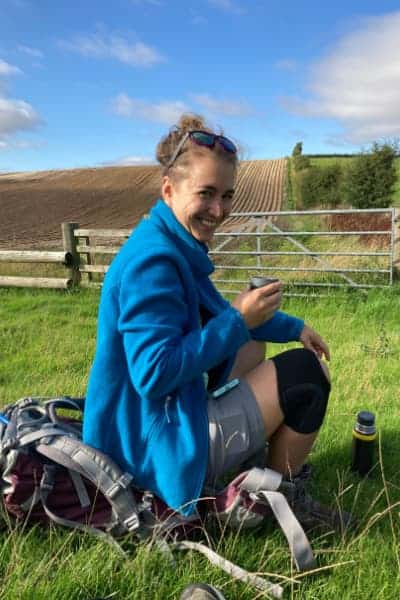How Much Caffeine Is In Black Tea?
I love coffee. But the java jolt is too intense for me first thing in the morning. So I brew myself a comforting cup of black tea with a bit of milk and sugar.
Like coffee, drinking black tea comes with certain health benefits. But if you want to reduce your daily caffeine intake, you need to consider how much caffeine is in black tea.
Read on to find out.
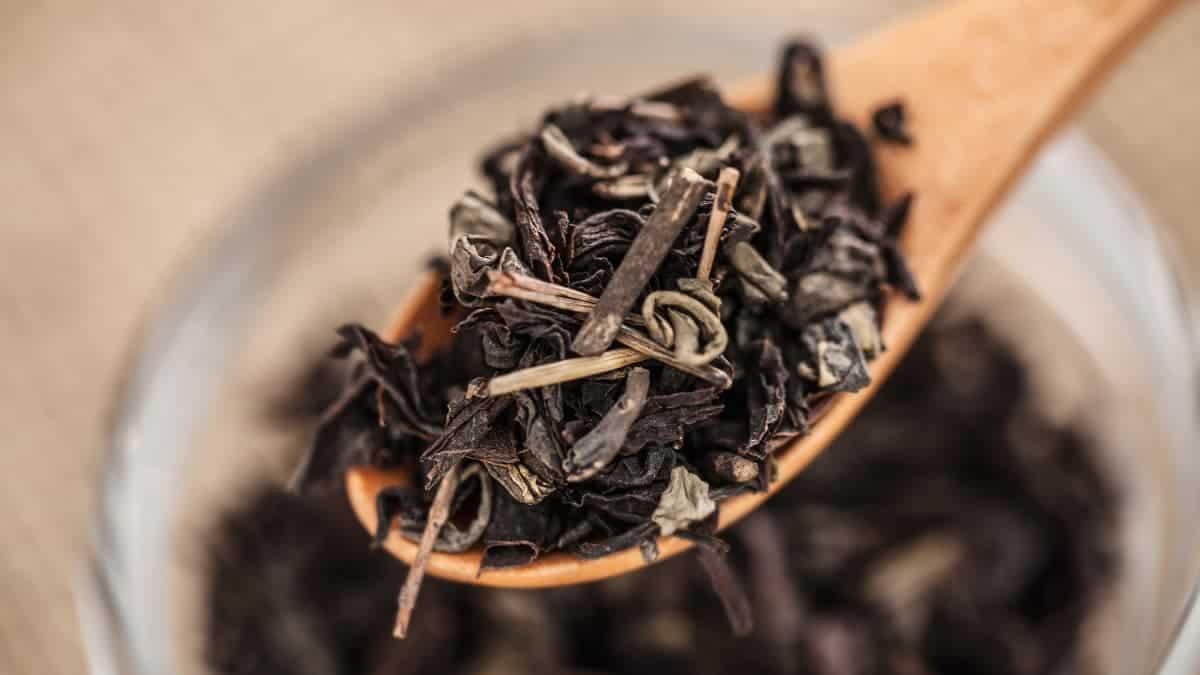
What Is Caffeine?
Caffeine is a natural stimulant. It increases activity in your central nervous system and brain. In small quantities, this stimulation can improve mood and alertness.
Caffeine occurs in coffee beans, cola nuts, guarana, and cacao. You’ll also find it in the camellia sinensis plant — aka the source of tea leaves.
According to the FDA, healthy adults can consume up to 400 mg of caffeine per day. That’s about eight cups of black tea.
Of course, caffeination tolerance varies from person to person. Influencing factors include body weight, medication, and individual sensitivity. Pregnancy and pre-existing health conditions will also determine caffeine safety.
Even minor caffeine intake can cause adverse effects in some people. Do you experience insomnia, anxiety, depression, nausea, or headaches? Over-caffeination might contribute to these symptoms.
In more severe cases, drinking more than four cups of coffee per day may cause high blood pressure. Scientists are still studying whether high caffeine levels contribute to heart disease.
Concentrated caffeine powders and liquids may pose serious health risks. These dangers include seizures, erratic heartbeat, and even death.
Fortunately, it’s not possible to achieve this kind of toxicity from drinking tea.
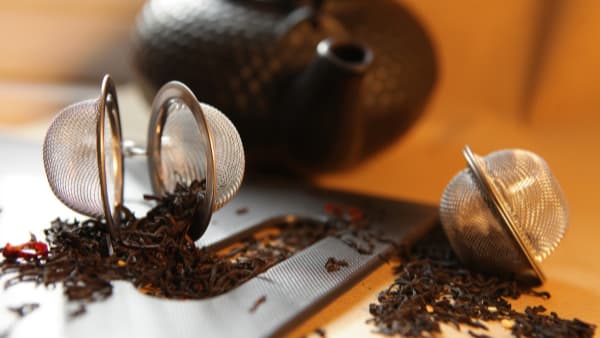
Black Tea Caffeine
All tea leaves come from the camellia sinensis plant. Since this plant contains caffeine, every type of tea contains caffeine.
Most teas are classified into one of six types: black tea, green tea, oolong tea, white tea, yellow tea, or pu-erh tea.
Fun fact: many popular “teas” aren’t made from the tea plant. This means that camomile, ginger, mint, and similar drinks are not technically tea.
That’s not to say these drinks aren’t tasty and don’t offer their own health benefits. But I want to be clear about this point because it ties into the issue of caffeination.
Since herbal tea is not made using leaves from the tea plant, it is naturally caffeine-free.
But back to black tea.
Black tea contains higher amounts of caffeine than green tea or other teas from the same plant. Why? Oxidation.
Oxidation is a chemical reaction. It takes place when freshly harvested tea leaves come into contact with oxygen.
The process of oxidation gives black tea its rich flavor and dark appearance. Oxidation also increases the caffeine in black tea.
Like coffee, tea contains polyphenols. These compounds offer many health benefits. But oxidation changes the nature of these polyphenols.
So if you drink black tea for health reasons, caffeine isn’t the only consideration. Black tea will offer slightly different health benefits than green tea.
Related Read: Black Tea Caffeine VS Coffee, Iced Tea Caffeine Content
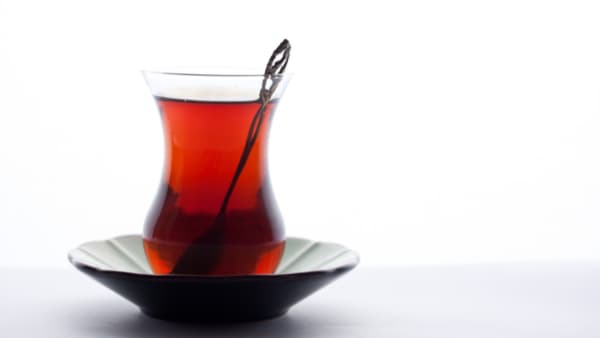
How Much Caffeine in Black Tea?
Black tea contains more caffeine than oolong, pu-erh, white, yellow, or green tea.
The exact caffeine content in black tea varies depending on a few factors: type of tea leaf, amount of tea leaves, steep time, and water temperature.
When you’re brewing a cup of black tea, you’ll either use a pre-packaged tea bag or loose tea leaves. Tea bags typically contain crushed leaves. Crushed leaves contribute to greater caffeine extraction than the whole leaves used for loose leaf tea.
Tea bags contain a standardized portion of tea and thus a more standard amount of caffeine. Brewing with loose tea leaves lets you adjust how much caffeine is in your cup of black tea. The more tea leaves in your cup, the more caffeine.
As tea steeps, caffeine content increases. Most black tea leaves need to steep for 3 to 5 minutes.
Brewing a cup of black tea requires boiling water. That’s a minimum temperature of 212° F (or 100° C). Hotter water increases the speed at which caffeine is released from the tea leaves into your drink.
Want to maximize cuppa caffeination? Use crushed leaves. Add more tea (or another bag). Increase steep time. And make sure that water has boiled.
How Much Caffeine in a Cup of Black Tea?
According to the folks at Tea Forte, a standard black tea contains about 42 mg of caffeine per 8 oz cup.
But remember. Many factors can impact the precise measurement. Caffeination will also vary from brand to brand.
Let’s look at Lipton, self-described as “America’s Favorite Tea.” A cup of Lipton Black Tea will contain 55 mg of caffeine.
In comparison, Tazo Awake English Breakfast contains upwards of 61 mg.
How Much Caffeine Is in Black Tea Compared to Coffee?
Before brewing, black tea leaves actually contain more caffeine than coffee beans. But unless you get your fix by munching dried leaves, this distinction isn’t very useful.
Here’s a more practical comparison.
The average cup of black tea contains 42 mg of caffeine. The average cup of brewed coffee contains 95 mg of caffeine. That’s over double the amount of caffeine.
Bean varietal, roast type, and brew method all influence coffee caffeine content. But generally speaking, black tea has less caffeine than a cup of coffee.
So if you’re trying to reduce your caffeine intake, you might want to swap that java juice for a cup of tea.
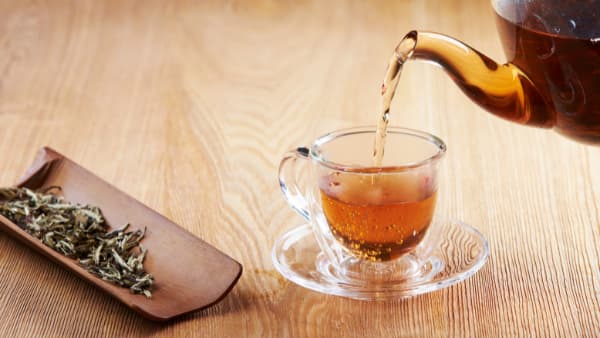
How Much Caffeine Is in Decaf Black Tea?
If you’re worried about the negative health implications of drinking caffeine, you might consider switching to decaf black tea. But unfortunately, decaffeinated black tea is not completely free of caffeine.
In fact, a cup of decaffeinated black tea will contain about 2 mg of caffeine. Yes, that’s 40 mg less than a regular black tea. But people who are especially sensitive to caffeination should sip carefully.
Unfortunately, I am one such sensitive sipper. I have taste-tested many a decaf tea. In my opinion, the best decaf black tea comes from British brewsters Yorkshire Tea.
(Their regular black tea contains about 2-3% caffeine. Their decaffeinated version contains just 0.2%.)
But even the best of the best decaf black tea often doesn’t do the trick. So if I have to choose between a decaf black tea and a mint “tea”, I’ll often choose the latter.
There are a few reasons I don’t usually drink decaffeinated black tea.
A) It’s not 100% free from the stimulant in question. And when it comes to a good night’s sleep, I’d rather be safe than sorry.
B) The process of decaffeinating black tea robs it of body and flavor.
C) There are so many tasty tea infusions and tisanes that are naturally caffeine-free.
In my opinion, decaf black tea is like decaf coffee. It is possible but not necessarily palatable.
Wrapping Up
An 8 oz cup of black tea contains about 42 mg of caffeine. In other words, about half as much kick as coffee.
Leaf type, amount of tea, steep time, and water temperature will change the caffeine in your cup of tea.
Like decaf coffee, decaffeinated black tea contains small amounts of caffeine.
Oolong, pu-erh, green and white teas are also caffeinated. They come from the same plant as black tea, the leaves of which contain caffeine. (As well as many health benefits.)
Want a hot beverage that is 100% free from this stimulant? Drink a “tea” made from herbs or other plants — camomile, mint, ginger, etc.

